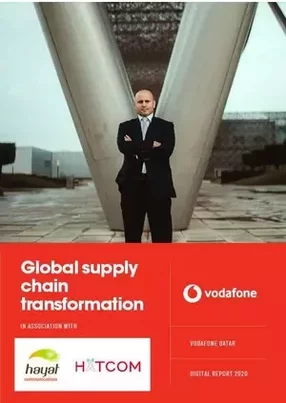With vast swathes of the population working remotely and living under lockdown conditions as a result of the global COVID-19 pandemic, the world has never been so dependent on telecommunications. Vodafone is playing a major role in keeping people and organisations connected. To do so, it has relied on a robust strategy that enabled it to overcome significant challenges to its supply chain.
Hicham Nehme, a Head of Supply Chain, explains that the Vodafone supply chain has been very much proactive rather than reactive, beginning a process of stringent crisis planning as early as December. First, the company identified four pillars for supply chain management (SCM) resilience: employees, customers, suppliers, and emergency planning. "After identifying these,” says Nehme, “we had a much greater understanding of how to manage the crisis.”
This process involved recognising the difficulties that employees may be experiencing in adapting to work from home; ensuring customers are getting the best possible service now that telecommunications are so essential to daily life; understanding its supplier profiles so that it is prepared for potential problems with sourcing and, finally, building a complete end-to-end strategy based on these points.The latter would enable Vodafone Qatar to move from crisis mode to business as usual.
SCM coordinated with each department on the local level, and with VPC on the group level, to determine what the biggest problems would be and what actions should be taken to solve these, both in the short and long term.
SCM strategy has revolved around being prepared - and anticipating scenarios rather than dealing with the fallout. For example, in January it bulk ordered stock to ensure it would have six or more months of supply delivered by March. It planned ahead in case of shortages that would lead to price increases, and signed three-year contracts with all its suppliers.
"When the pandemic started, the first question was how can we import from China, and we generated tens of scenarios looking at how we could do this,” notes Nehme. “Now the whole world is locked, and the situation has changed to: ‘how can we import from the rest of the world’? It's important to learn from previous crises and manage change using new technology." As a result the company has started using entirely virtual marketplaces such as Amazon.
Another key point is not being heavily reliant on just one territory, such as China. "I believe China will face a lot of problems in the coming years because of what people believe to be the cause of the pandemic. We don't yet know how big companies that operate in China like Apple will react, but we need to prepare so the supply chain remains continuous and sustainable," Nehme explains. "There are a lot of different opinions out there, but I think business needs to be spread across many countries, not centralised in one area."
The COVID-19 pandemic has highlighted how essential digitalisation is. "Digital tools are not a privilege anymore," Nehme explains. "They're being used all over the world during this crisis. We've moved from attending school to e-learning, and doctors are giving medical advice through Skype and Zoom. We know the whole world will change after this, and the most important aspect is digital transformation, now a main part of any company.
"Every organisation must have at least a vision for digital transformation" Nehme adds. “For the supply chain in particular, digitising operations can improve speed and reliability, from how fast products can be manufactured to how promptly order fulfilment and delivery to the final destination can be made. But to implement digital transformation well it's also crucial to pay attention to the organisation's structure and how this will change. That’s why any successful digital transformation starts from the top, from the leaders, and works down to the employees."
While data analysis is becoming increasingly useful, it will play an even more important role in the future, along with blockchain and AI. "We're now using data analysis more than ever before to forecast," Nehme explains. “This is enabling organisations to look at potential impacts on projects and profitability.”
Technology aside, he shares that strong partnerships are also essential to success. "If companies act like solo endeavours they will fail. Organisations depend on their surroundings and their suppliers to build technology and share knowledge."
Considering those suppliers, Nehme explains that the crisis has led to a redefining of what a partnership can be. "It's led us to reevaluate our suppliers based on how they react during the crisis, and whether they were available when we needed them," he affirms. "How you react towards a crisis and how you support your organisation when it needs you, is the most important part of the supply chain."
Among the company’s suppliers and partners are those in the telecommunications industry such as Hayat Communications, on whom Nehme has counted for many projects. In the same industry, HATCOM Telecommunications is another strategic partner with whom Nehme has worked across many projects.
Looking ahead, Nehme envisages the independence of supply chains: "For countries like the US or Europe, the first thing that they face is a lack of supply chain planning. They have the capability but they don't have the tools or the materials, so they'll have to find new ways to bring in new materials and new products", he says.
"We're going to see supply chain organisations working separately and becoming businesses. The most important thing for any country right now is securing food, medication and medical equipment for their people. They don't need someone sitting behind a desk telling them their balance sheet has dropped. The most important thing now is how to survive, and to survive you need a supply chain."




